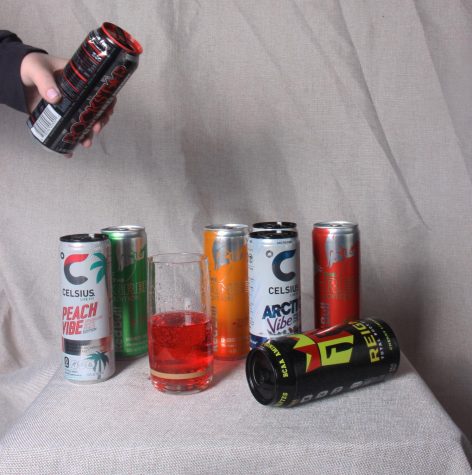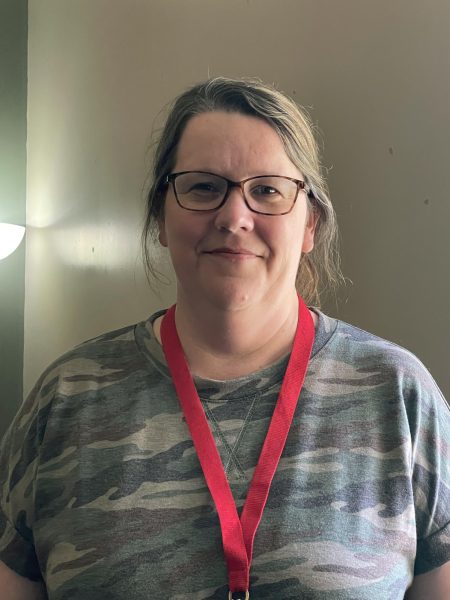Stay Awake
Many people don’t experience enough rest and fall prey to the addictive substance that is caffeine
In a sort of epidemic of caffeine addiction and sleep deprivation, people of all kinds are suffering from a cycle of low energy and quick fixes for the problem.
Junior Thomasina Brown said sleep deprivation is something that happens gradually under certain conditions.
“You get behind on homework, you try to catch up and you don’t finish it all in one night because you want to get sleep, but then it just keeps building up.” Brown said. “People who are in a lot of extracurriculars or advanced classes with more homework [can become sleep deprived] just because the extracurriculars take up a lot of time after school, and even with that it adds to the homework.”
Because so many students have such busy schedules, sleep can be hard to come by. Lindsay Ball, lead nurse for Nixa Public Schools, said she has seen large numbers of students who are not getting enough sleep.
“…Your schedule being overloaded, working late at night and staying up late to do homework [or] being involved in tons of activities on top of just having a busy lifestyle can all play as factors into [being sleep deprived].” Ball said
Although the effects of sleep deprivation can be different for anyone, it can make keeping up with schooling difficult for students. Junior Artiom Viscrebov said he is sleep deprived, which poses a challenge during school.
“I fall asleep in some of my classes and … I miss stuff occasionally,” Viscrebov said.
Viscrebov had intensive work hours at his job, and however difficult, he said he still made time to do homework.
I come home … and I catch up on everything I missed from the day before,” Viscrebov said. “It’s like a cycle. The more I miss, the more I don’t sleep because I have to catch up…”
For others, sleep deprivation is caused by involuntary conditions. Junior Madison Greene is chronically sleep deprived and diagnosed with clinical insomnia.
“It’s different for everybody, but for me, I [rarely] fully sleep,” Greene said. “…Sometimes I do fully sleep but it’s mostly when my body is so tired it just can’t keep going. …It’s mostly that I don’t have enough time to fully fall asleep.”
Regardless of how one becomes sleep deprived, the prolonged effects of sleep deprivation can be dangerous.
“If you’re not … allowing [your brain] to rest and go through its cycles at night, it can negatively affect your emotional and mental health,” Ball said. “It can lead to increased depression, increased mood swings [and] irritability. Then, if you’re not able to perform the way you want to during the day and get your tasks accomplished, … that can also lead to increased depression, anxiety and stress.”
Without being able to perform effectively during the day, it can be easy to fall behind.
Viscrebov said the most important thing to note is how sleep deprivation is a cycle.
“The more you’re sleep deprived, the more you need to catch up–The more you need to catch up, the more you’re sleep deprived,” Viscrebov said. “It goes over and over again.”
This ongoing cycle can be persistent, especially for those with intensive schedules.
“…It gets really difficult to kind of break away from it once you start and I think that’s something that people need to be aware of,” Brown said. “Just the long term effects of feeling constantly burnt out and tired … kind of affects your mood…”
Many people experiencing these symptoms often turn to a quick and readily available source for energy: caffeine.
“I end up drinking energy drinks and drinking coffee … just to help me stay awake,” Greene said.
Ball said she thinks caffeine has become a more popular solution to low energy.
“ I think kids are really busy and teenagers load their schedules up really full [so they] … access an easy substance that will help boost energy and make [them] feel like [they] can accomplish more…” Ball said.
However, excessive intake of caffeine can cause a variety of health defects.
“It really depends on how much you’re consuming and how often you’re consuming it,” Ball said. “Intaking too much caffeine can lead to dependency and it can have some negative side effects if you consume it regularly.”
One of the most common dangers of caffeine is addiction.
“If you get to the point where you’re not using it regularly, you can have withdrawal symptoms which can impact your day,” Ball said. “You can get headaches, fatigue, brain fog, it can cause heart rhythm issues, blood pressure issues–not only that, but long term use can disrupt your sleep cycle–it can cause an increase in depression and emotional swings…”
Viscrebov said he has experienced certain withdrawal symptoms because of his dependency on caffeine.
“I usually chug a redbull or a coffee every single day to help me,” Viscrebov said. “I built up a tolerance so I need more caffeine to not sleep [during class.] There was a time where one bottle of RedBull wasn’t enough–I was still falling asleep.”
Although he is aware of the effects, Viscrebov said caffeine helps him be more aware when he is tired. Greene uses caffeine for the same reason.
“…Sometimes [lack of sleep] does affect my grades because I have trouble paying attention in class because I’m so tired,” Greene said. “I’m still tired but I’m able to pay more attention, so that’s why I have [caffeine] during school. … A lot of times, caffeine is just really addicting.”
The addictive nature of caffeine can oftentimes be overlooked by those looking for quick energy.
“I think [caffeine is] the first thing people turn to [when] they’re sleep deprived. Viscrebov said.
While excessive consumption can lead to dangerous effects, healthy quantities of caffeine are safe depending on age, weight, health and other factors.
“For teenagers, I think they really only recommend 100 milligrams a day, which is about a cup of coffee,” Ball said. “So when you get into your adult years I think it can vary just depending on your lifestyle and your age…”
Even with caffeine as an easy energy source, it is important to avoid dependency on it during the day, and to create healthy sleeping habits during the night.
Greene advises creating a healthy sleep schedule in order to get a full night’s rest.
“For people who just don’t go to bed on time …, it’s mostly just finding when is a good time for you to start going to sleep, and creating a schedule…” Greene said.
Although breaking an unhealthy sleep schedule or caffeine addiction can be difficult, there are solutions and methods of support out there.
“…[Learn] how to manage time and not overload your schedule with too much and … reach out for support personnel if you feel like you are relying on something to help boost your energy throughout the day,” Ball said. “Try to tap into some of those resources…”


I am a junior, the managing editor for Wingspan this year, and I joined Wingspan the second semester of the 2020-2021 school year. I love band, hanging...






